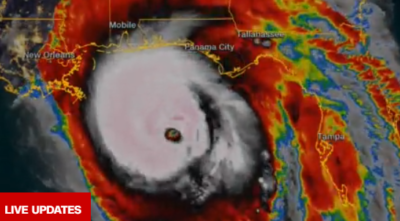 As I write, yet another disaster threatens the United States. Hurricane Michael, a category 4 hurricane with 140 mph winds will make landfall in the Florida panhandle in a few hours. With little time to evacuate, residents have been warned to shelter in place.
As I write, yet another disaster threatens the United States. Hurricane Michael, a category 4 hurricane with 140 mph winds will make landfall in the Florida panhandle in a few hours. With little time to evacuate, residents have been warned to shelter in place.
Often forgotten when these natural disasters are reported are the churches and congregations that experience them along with everyone else in the community. And yet these “sub-communities” offer significant and resilient resources to help in disaster recovery.
While every disaster is unique and every church is unique, there are similarities in both the impacts disasters have on churches and in the ways churches respond to them.
A disaster is never fun. By definition, a church and congregation experiencing a disaster will suffer great damage and perhaps even loss of life. Here are some of the negative effects disasters have on churches.
Increased Stress on the Pastor and Church Leadership
In my survey on how churches deal with disasters, one pastor wrote that the disaster “was overwhelming. The church building and my home were severely damaged, so it was difficult to do ministry.” Another said he “developed high blood pressure, eventually had a heart attack and open heart surgery” as a result of the disaster. The disaster “was demoralizing. The hurricane marked a negative turning point in the ministry,” said another pastor.
Decrease in Attendance and Giving
Many churches experience a loss of members and a downturn in giving, aggravating the effects of the disaster when support is most needed. One pastor writes, “We were affected by the loss of members, lack of homes during reconstruction, and loss of leaders.” Another says, “It lowered attendance by about 10% and had a general demoralizing effect.” Yet another laments, “Most of the members we lost did not return.” And finally, “Hurricane Andrew nearly destroyed our community. A lot of our citizens and members of our church moved away.”
Damage to Church Property
In my survey, damage to church property ranged from “Our church building wasn’t affected,” to “It tore off part of our roof and part of the roof on the parsonage,” and “It (the church) was severely damaged.”
To summarize the negative impacts a disaster can have on a church and congregation: churches experiencing a disaster can expect more stress on church leadership, greater, and perhaps overwhelming, need, and reduced in-house financial resources to meet the need.
What then, can a church do when faced with an overwhelming disaster? Fortunately, there are ways a church can respond to the destruction a disaster leaves behind that can mitigate the suffering, bring glory to Jesus Christ, and be an encouragement to the congregation.
A Disaster is an Opportunity for a Pastor to Call the Congregation to Greater Faith
One pastor responded that the disaster “gave me the opportunity to challenge or congregation to trust God to do great things.” “We grew stronger in faith,” writes another. Seeing God meet needs after the disaster was a”real shot in the arm,” says another.
Pastors Do Better When They Reach Out to Other Pastors for Help
Pastors who tried to bear the load themselves without outside help suffered as a consequence. When asked what they would do differently if the disaster were to happen again, one pastor writes, “I would … unite with other local pastors to help with the general community.” “Pastors in our community united, formed a 501c3 and distributed donations to those affected.”
Churches Do Better when They Reach Out to Other Churches for Help
Churches can serve as staging areas for arriving volunteers from other churches. “We had teams come from as far away as Maine, Ohio, Illinois, Oregon and Texas – multiple times in some cases. Not only did these teams gut flooded houses, they replaced sheetrock, roofs and did electrical work. And they went to the French Quarter and did street witnessing.” Again, “We sent work crews to members of our community and other parts of the city. We started first with members, then extended family of members, then friends of members, then others in the community. Probably thousands of workers came through our church.”
Churches Provide Excellent Resources for Members in the Congregation Most Affected by the Disaster
Pastoral leadership can serve as a triage for those in the congregation with the greatest needs. “Steps were set up by which help was distributed to those without insurance.” Another pastor writes, “We helped each other rebuild, we provided emotional support, and, when needed, financial support. We helped each other any way we could. We provided housing in some cases and furniture and food and most of all, kindness.” And finally, “They loved and cared for each other as the needs arose.”
In summary, disasters remind us that life is tenuous, but the church is tenacious. When responded to the right way, a disaster gives a church the opportunity to shine the light of God’s love and the gospel of Jesus Christ in this fallen world.
This post first appeared in NewCommandment.org.
_______________________________________________________________

Learn how to form teams of men for every widow, single mom
and fatherless child in your church at NewCommandment.org.
_______________________________________________________________